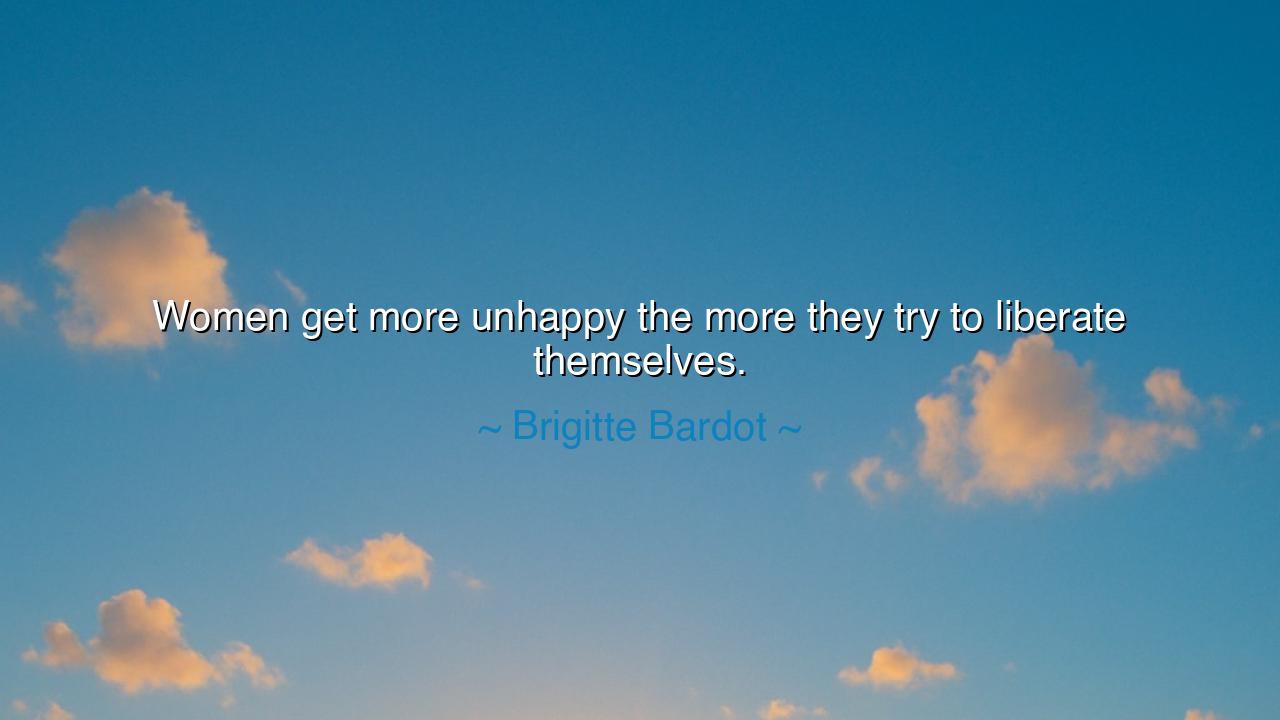
Women get more unhappy the more they try to liberate themselves.






The words of Brigitte Bardot—“Women get more unhappy the more they try to liberate themselves”—resound with the paradox of freedom, the tension between desire and fulfillment. They reflect the disquiet of an age when women, reaching for equality, found that the breaking of chains did not always bring immediate joy. For liberation is not a single act but a long, weary journey: it tears down old walls, yet it also exposes the traveler to storms and solitude. Bardot’s words, spoken from her own struggles in the glare of fame, remind us that freedom without foundation can be as heavy a burden as captivity itself.
The origin of this wisdom lies in the ancient truth that all revolutions bring both victory and sorrow. When one rises against oppression, the heart fills with fire, but once the battle is won, there comes the cold weight of uncertainty: what now? For centuries, women were confined to roles prescribed by men and tradition. The movement to liberate themselves promised a brighter dawn, yet the world often answered with resistance, judgment, and confusion. Thus, many discovered that freedom is not only the casting off of bonds, but the difficult labor of building a new life upon the ruins of the old.
Consider the story of Emmeline Pankhurst and the suffragettes of Britain. They fought fiercely for the right of women to vote, enduring prison, hunger strikes, and public scorn. Their triumph opened doors that had been closed for centuries. Yet even in victory, many of them faced unhappiness, for the society around them was slow to accept the changes they had won. The battlefield of politics had shifted, but the struggles of daily life—the prejudices, the dismissals, the unequal burdens—remained. Their liberation was real, yet it carried sorrow alongside joy.
Or recall Simone de Beauvoir, whose work The Second Sex unmasked the structures that held women captive in their roles. She herself lived a life of intellectual freedom, yet often spoke of the loneliness and struggle that came with it. To liberate oneself from convention is to walk a harder road, one without ready maps or easy acceptance. It is a path that demands resilience, and many, as Bardot observed, stumble beneath its weight, feeling the pang of unhappiness even as they stride toward freedom.
The meaning of Bardot’s words, then, is not to deny the need for liberation, but to warn of its cost. To seek freedom is to awaken not only power but also responsibility. The old world, with all its constraints, at least offered certainty. The new world, born of liberation, demands that one create meaning afresh, and this work is arduous. Happiness cannot be guaranteed simply by casting off chains; it must be cultivated in the heart, in community, and in a new vision of life.
The lesson for us is clear: liberation alone does not bring peace. True freedom requires both inner strength and outer transformation. If women, or any people, are to find happiness in freedom, they must not only shatter the prison but also build a home in the open fields beyond it. Liberation must be paired with purpose, with solidarity, with a deep understanding of self and community. Without these, freedom can feel like exile rather than arrival.
Practical wisdom calls us to act. Support those who fight for their rights, but do not abandon them when the chains are gone—help them create new foundations. If you yourself seek liberation, prepare also to tend your spirit, to anchor your freedom in values, love, and vision. Recognize that unhappiness may come in the struggle, but let it not dissuade you; it is only the shadow cast by the light of transformation. Hold firm, and in time, joy will grow from the soil of hardship.
Thus, let Bardot’s words be remembered as both caution and call: the road to liberation is steep, and on it many stumble. Yet to walk it is still the noblest of journeys. For though unhappiness may accompany the breaking of chains, it is the price of becoming whole. And those who endure find, at last, not only freedom but a deeper, truer happiness—one not given by the world, but forged by their own unyielding spirit.






NLMat Nao Lien
I can’t help but feel that this quote reflects a broader societal discomfort with change. The idea that women become more unhappy the more they try to liberate themselves seems to ignore the real benefits that come from independence. Could it be that this unhappiness is more about the challenges women face when they step outside the traditional roles they’ve been assigned, rather than the pursuit of liberation itself?
DTNhat Minh Dang Tai
This quote from Brigitte Bardot seems to reflect the complex realities women face when trying to carve out their own path in a society that still holds on to traditional gender expectations. But does liberation necessarily lead to unhappiness, or is it the judgment and limitations from others that create this unhappiness? Can’t pursuing independence also lead to a sense of empowerment and fulfillment?
THHoang Thi Hang
I find this quote a bit troubling because it seems to imply that women should just accept their circumstances instead of seeking to improve them. Shouldn’t women have the right to pursue freedom and happiness, even if it doesn’t fit within traditional expectations? Could it be that the struggle for liberation is often met with resistance, not just from society, but from internalized norms women have been taught to accept?
TMMai Tien Manh
Brigitte Bardot’s quote strikes me as a rather cynical view of women’s liberation. It seems to suggest that the pursuit of independence and equality leads to unhappiness. Is this really true, or is it more a reflection of societal pressures that make it difficult for women to achieve true liberation? I wonder if the unhappiness comes from external judgment or internal conflict about shifting traditional roles.